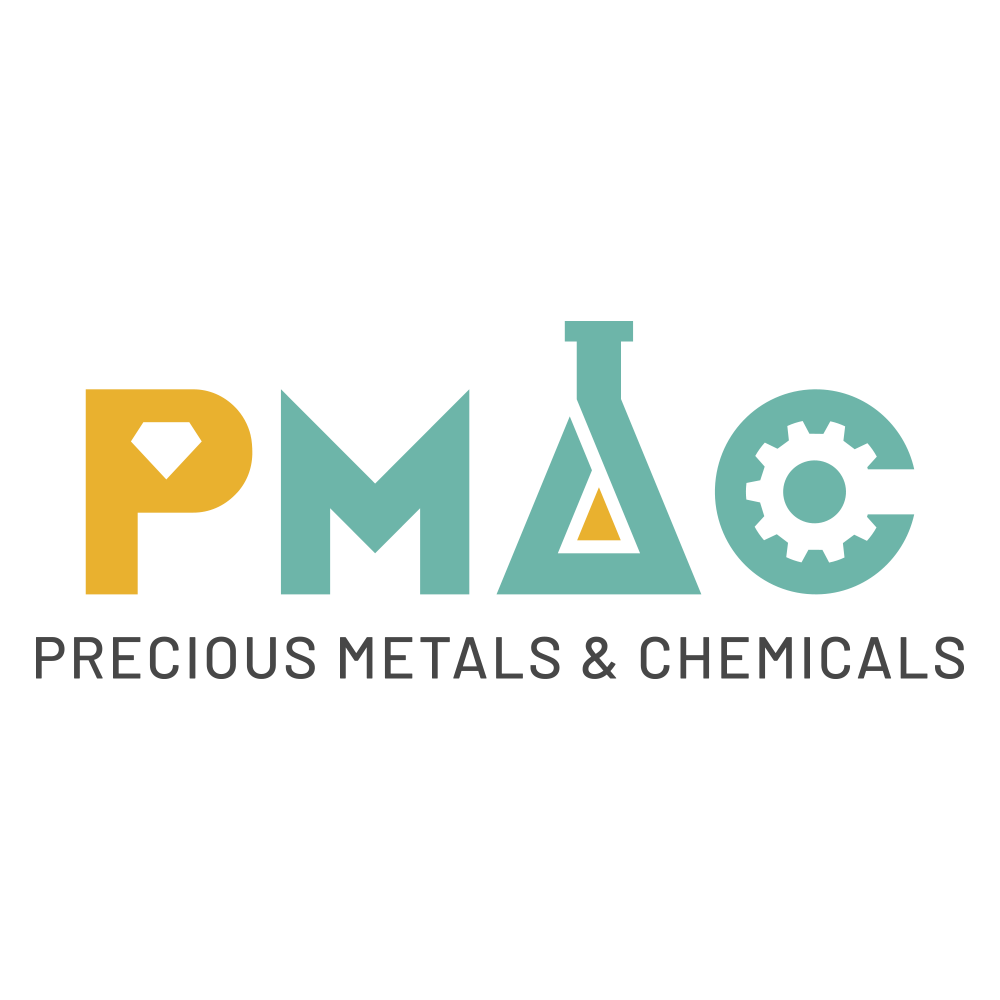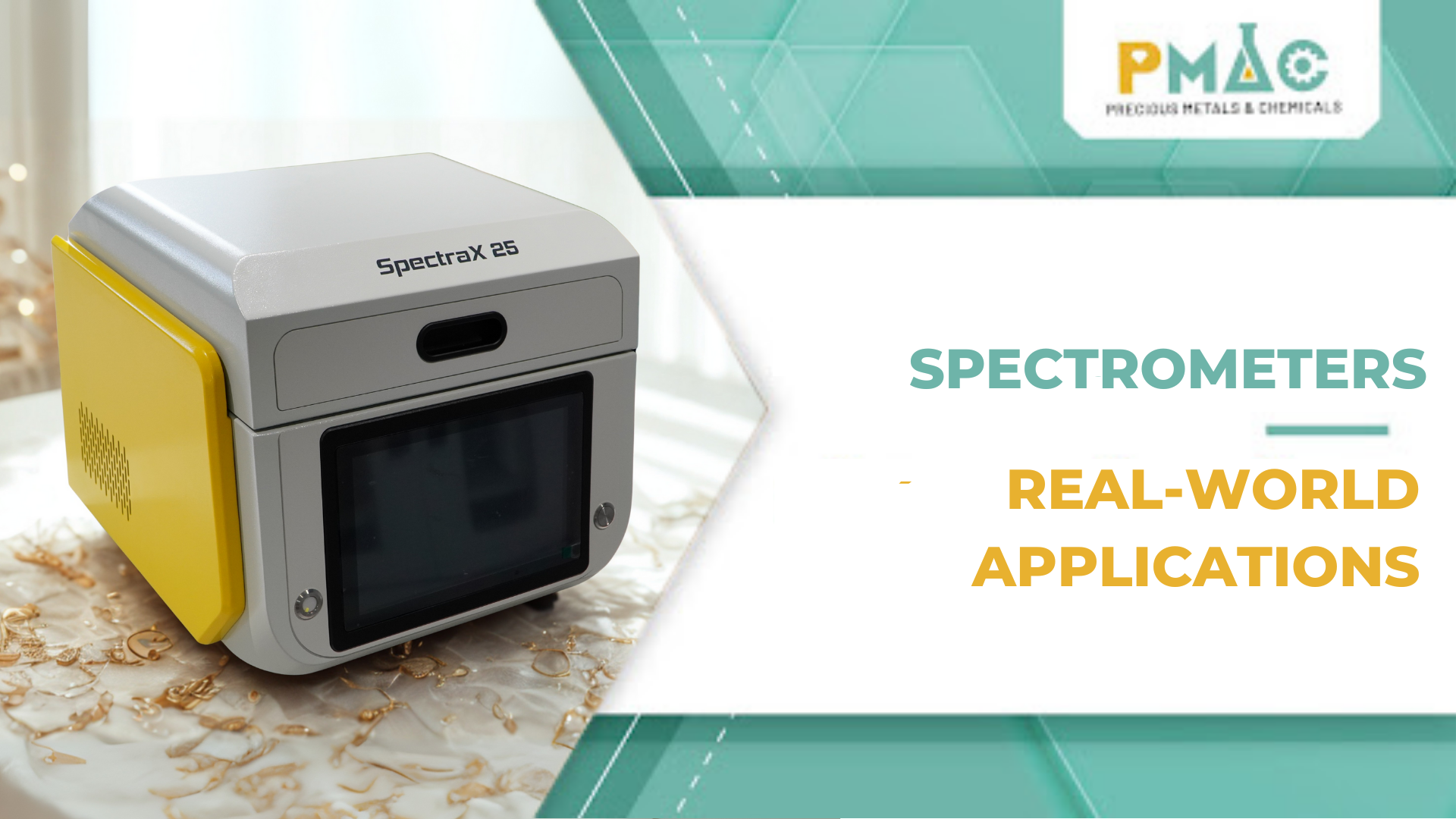Spectrometers are becoming an important trend in modern research and industrial production. This article provides an overview of the concept, operating principles, common types, a comparison with traditional methods, and why these testing instruments are increasingly essential in laboratories, manufacturing, and the jewelry sector.
I. What is a Spectrometer?
A spectrometer is a scientific instrument used to analyze the composition of matter through the interaction of light with a sample. When light shines on the sample, the device disperses it into different wavelengths and records the characteristic spectrum, which can then be used to identify chemical composition, concentration, or material structure.
The standout feature of spectrometers is their ability to provide fast, accurate, and objective results without complicated testing procedures. For this reason, they are often referred to as the “quality gatekeepers” in many industries as well as in scientific research. Basic components of a spectrometer include:
- Light source: emits UV, visible, infrared, or X-ray beams.
- Dispersion system: prism or grating to separate the light.
- Detector: sensors that capture the spectral signal.
- Analysis software: processes the data and quickly displays results.
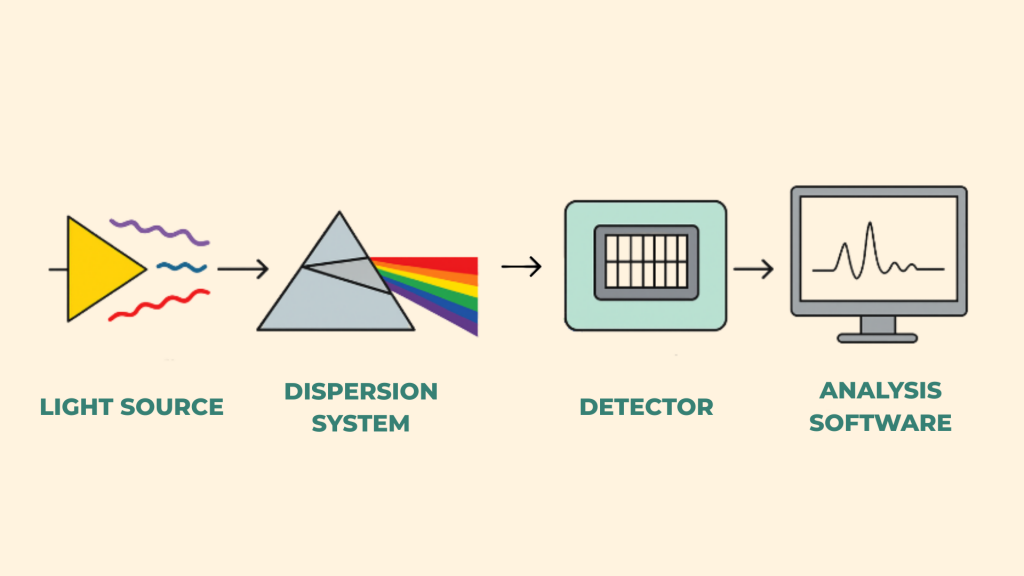
Basic Structure of a Spectrometer
General principle: every element or compound has a unique spectral fingerprint. The spectrometer captures this signal and compares it with a reference library to provide precise identification.
II. Common Types of Spectrometers
Spectrometers are not limited to a single type. Each is designed for specific purposes, from laboratory research to industrial production or jewelry testing. Here are the four most common types you should know before making an investment:
- UV–Vis Spectrometer (Ultraviolet–Visible): This is the most widely used spectrometer in laboratories. UV–Vis measures light absorption in the ultraviolet and visible ranges. It is commonly applied in chemistry, biology, pharmaceuticals, and food testing.
- Infrared Spectrometer (FT-IR, NIR): FT-IR and NIR operate in the infrared region to analyze molecular structures. These devices are especially useful in agriculture, pharmaceuticals, chemicals, and the testing of organic raw materials.
- Atomic Absorption Spectrometer (AAS): AAS is used to detect heavy metals and trace elements. It can accurately measure toxic metals such as lead, mercury, and cadmium, contributing to public health protection.
- X-ray Fluorescence Spectrometer (XRF): XRF uses X-rays to stimulate samples, producing characteristic fluorescence that reveals their elemental composition. It is a trusted solution for testing gold, alloys, and precious metals thanks to its high accuracy and non-destructive process.
III. Real-World Applications of Spectrometers
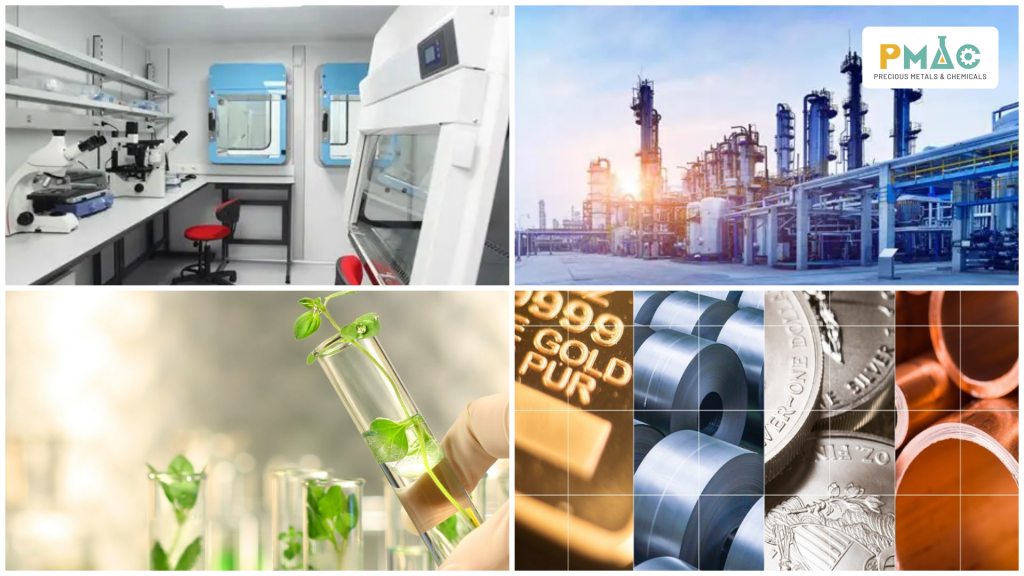
Real-World Applications of Spectrometers
No longer limited to laboratories, spectrometers (analytical instruments, testing devices) are now widely used in production, commerce, and quality control. In research, they support chemical analysis, material development, and hypothesis verification. At the industrial level, they act as essential tools to ensure consistency and reliability.
1. In Laboratories & Scientific Research
A spectrometer is an indispensable scientific instrument in chemistry, biology, and materials research. It helps scientists identify sample composition, explore material characteristics, develop new substances, and validate scientific theories. With their precision and objectivity, spectroscopy has become a fundamental part of modern research.
2. In Industry: Quality Control & Materials Testing
In manufacturing, spectrometers serve as quality control instruments. They analyze raw materials, detect impurities, and ensure that final products meet international standards. Industries such as steel, cement, and chemicals rely on spectroscopic analysis to maintain stable quality, minimize risks, and enhance competitiveness.
3. In Pharmaceuticals, Food & Environmental Monitoring
- Pharmaceutical industry: measures active ingredients in medicines, ensuring safety and effectiveness.
- Food industry: detects additives or banned substances, helping maintain food quality.
- Environmental monitoring: measures heavy metal concentrations in water, soil, and air, providing timely warnings to protect public health.
4. In Precious Metal & Gold Analysis
In particular, X-ray fluorescence spectrometers (XRF analyzers) are proving their strength in precious metal analysis. They can quickly determine gold karat (10K, 18K, 24K, etc.) within seconds, making it easy to distinguish between real and fake gold. Thanks to this, jewelry shops, manufacturers, and certification centers can conduct safe, transparent transactions while strengthening their credibility and minimizing risks.
>> Read more: Why Jewelry Stores Should Use a Gold Testing Machine (Spectrometer)
IV. Why X-RAY Fluorescence (XRF) Spectrometers Are Popular
Among the many types of spectrometers, XRF analyzers are increasingly applied, especially in metals, alloys, and the jewelry industry. Their growing popularity comes from several outstanding advantages:
1. Fast, Accurate & Non-Destructive Analysis
An XRF spectrometer allows rapid and precise analysis without damaging the sample. Unlike traditional chemical tests that may alter or scratch the surface, XRF testing equipment preserves the value of the material. Results are delivered within seconds with an accuracy margin often below ±0.1%, making them highly reliable for jewelry transactions as well as industrial production.
2. Save Time & Reduce Testing Costs
Beyond accuracy, XRF spectrometers help save significant time and cost. Businesses no longer need to send samples to external laboratories; instead, they can test on-site. This is particularly valuable for jewelry stores where transparency in every transaction is crucial, as well as for production lines that demand continuity and efficiency.
3. Multi-Industry Applications
Another advantage is the broad application of XRF spectrometers. In addition to gold and precious metals, they can analyze alloys, soil, cement, plastics, and even electronics. Thanks to this versatility, companies can maximize their investment while benefiting from a wide range of applications in both production and business.
>> Read more: Best Thermo Fisher XRF Analyzers Available
V. How to Choose the Right XRF Spectrometer
XRF spectrometers are becoming the top choice for jewelry testing and metal analysis thanks to their high accuracy, speed, and non-destructive process. However, to choose the most suitable equipment, you should consider the following key factors:
1. Choose Based on Scale & Purpose
- Small and medium jewelry shops: handheld XRF spectrometers – compact, easy to use, allowing fast at-counter testing. Popular models include: Niton XL2 100G, Niton XL3t GOLDD+, Niton XL5 Plus .
- Large jewelry chains or certification centers: benchtop XRF spectrometers – offer superior accuracy, in-depth analysis, and wide alloy detection. Notable models include: SpectraX 30, SpectraX 25, DXL 800.
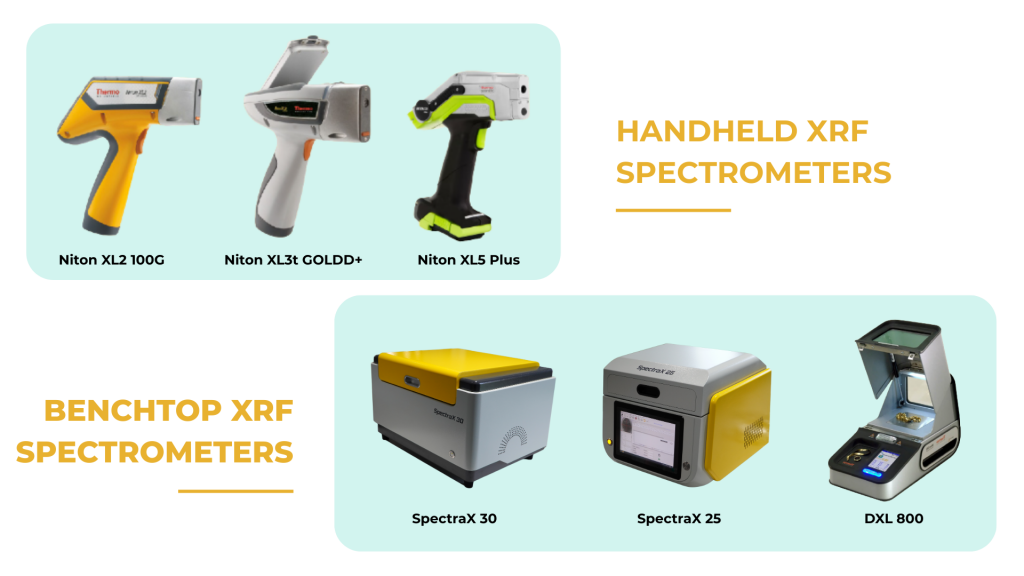
Popular Spectrometer Models
Tip: Define whether you need flexibility or deep accuracy. Understanding your goals will help you avoid choosing the wrong instrument and wasting resources.
2. Consider Budget & Long-Term Costs
High-quality XRF Spectrometers may require significant upfront investment, but think about long-term value instead of just purchase price. Benefits include:
- Saving on external testing costs.
- Reducing risks of buying fake or under-karat gold.
- Gaining long-term profits through trust and transparent business operations.
3. Prioritize Reliable Suppliers with Strong After-Sales Support
A good spectrometer must come with equally good services. A trusted supplier doesn’t just sell equipment but also provides accurate consultation, on-site installation, training, and long-term maintenance.
After-sales service accounts for nearly 50% of the device’s effectiveness. That’s why you should choose a long-term partner rather than just a seller.
>> Read more: Free Spectrometer Demo at PMAC
VI. PMAC – Trusted Distributor of Genuine XRF Spectrometers
PMAC provides a wide range of XRF spectrometers from handheld to benchtop models, suitable for every jewelry business – from small shops to large chains. All models are highly accurate and user-friendly.
PMAC is proud to be the official distributor of Thermo Scientific (USA) – one of global leaders in spectroscopy and metal analysis instruments with over 60 years of history. Thermo Scientific devices are trusted by millions of businesses and research organizations worldwide, especially in the field of precious metal testing and elemental analysis. Key strengths of Thermo scientific XRF spectrometers include:
- High precision: delivering reliable, detailed results within seconds.
- Versatile applications: supporting laboratories, jewelry companies, and large enterprises to enhance product quality and competitiveness.
- Professional services: PMAC ensures not only high-quality products but also comprehensive after-sales support, training, and technical assistance.
When purchasing from PMAC, customers are guaranteed:
- 100% genuine products.
- Official warranty and long-term technical support.
- Free training and on-site installation.
- A professional local technical team in Vietnam.
- Flexible payment plans and installment options.
VII. Trade-In Program – Upgrade to the Latest Spectrometer
SPECIAL OFFICER: PMAC is currently running a trade-in program for XRF spectrometers. With this program, customers can easily replace outdated or unstable devices with the latest genuine models – more accurate, durable, and reliable.
This program not only helps reduce upfront investment costs but also brings double benefits:
- Avoiding waste and contributing to environmental protection.
- Ensuring you always have access to the most advanced testing technology.
In addition, PMAC guarantees full support – from consultation and installation to warranty and periodic maintenance – so customers can operate with complete peace of mind.
If you are looking to upgrade your equipment for higher business efficiency and stronger credibility, PMAC – the official distributor of advanced XRF spectrometers – is your best choice.
Contact PMAC today for tailored solutions and special offers!
PMAC – PMAC Joint Stock Company
- Address: Hi-Tech Park, 4th Floor, HUTECH Building, D1 Street, Long Thanh My Ward, Thu Duc City, Ho Chi Minh City, Vietnam
- Website: https://pmac.asia
- Hotline: +84 938 085 278
